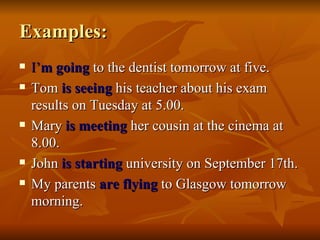How to express the future
- 1. HOW TO EXPRESS THE FUTURE IN ENGLISH GOING TO – WILL – THE PRESENT CONTINUOUS – THE PRESENT SIMPLE
- 2. GOING TO We use going to when we have decided to do something, that is when we are talking about our intentions or plans. When we are sure about the future because of something we see in the present
- 3. Examples: I ’ m going to buy a laptop so I can work on the train. I think John is going to study English at University. I’ve decided. I ’ m going to stop smoking. They ’ re going to see their friends some time soon. My parents are going to visit New York next summer. She is pregnant- she ’s going to have a baby . Look at those big black clouds! There ’s going to be a storm.
- 4. WILL We use will to show our intentions and attitudes towards other people. We use will to express our desire or willingness to do things when reacting to present situations (making decisions at the moment of speaking)
- 5. Examples: I can’t do this” “Don’t worry, I’ ll help you” “ We’ve got a letter from John and Mary” “I’ ll answer it.” I like this coat. I think I’ ll buy it. A: What would you like to eat? B: We’ ll have a pizza
- 6. THE PRESENT CONTINUOUS We use the present continuous to talk about future arrangements and plans, especially when they involve other people and have a time and date.
- 7. Examples: I’ m going to the dentist tomorrow at five. Tom is seeing his teacher about his exam results on Tuesday at 5.00. Mary is meeting her cousin at the cinema at 8.00. John is starting university on September 17th. My parents are flying to Glasgow tomorrow morning.
- 8. THE PRESENT SIMPLE We use the present simple when future events are part of a schedule or timetable.
- 9. Examples The winter term starts on 10 January. The train leaves at 12.30 and arrives at 16.15.








